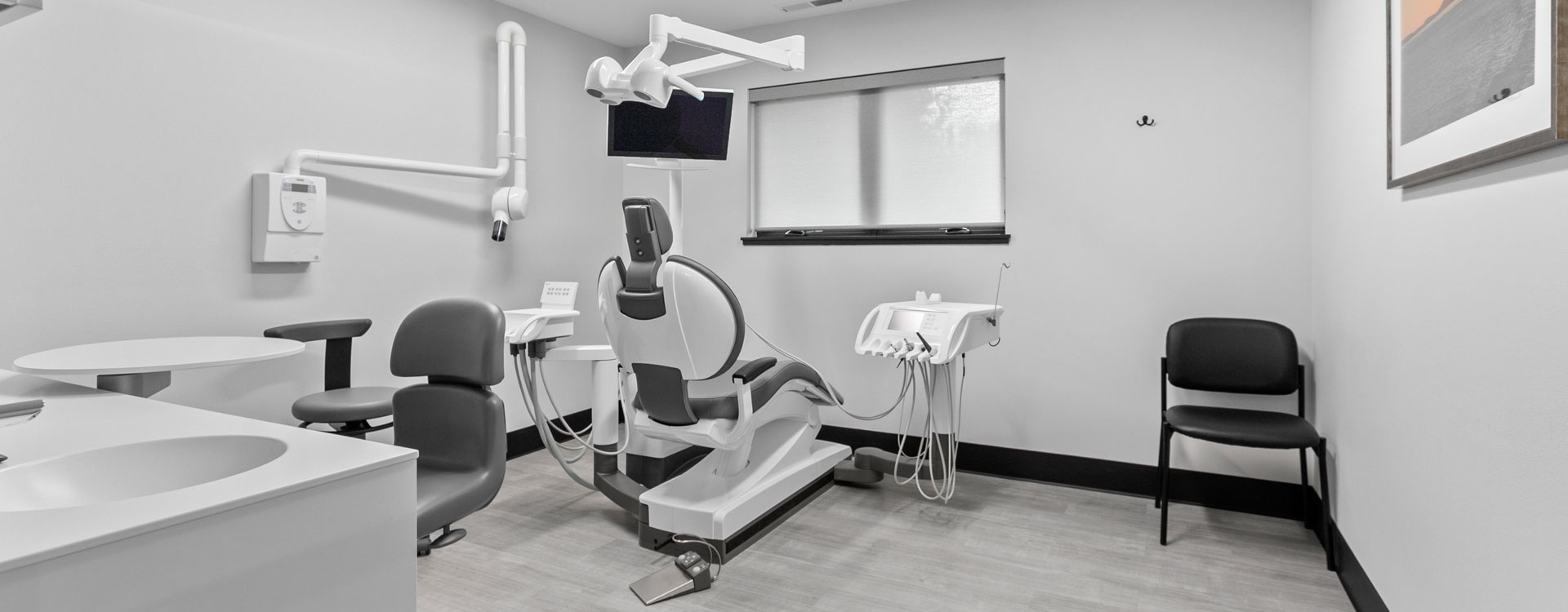What are Dental Implants?
Dental implants provide a safe, durable replacement for missing teeth. Dental implants function like natural teeth and have a very natural appearance within your mouth. Our doctor is committed to ensuring your optimal comfort and quality care. To that end, we make use of the latest techniques and technologies that allow efficient, stress-free treatment. Many of our patients find dental implants to be an appealing tooth loss solution and are pleased by how relaxed and comfortable their experience can be.
Implantation
Implantation is the first stage in a two-part process that provides a long-term solution for tooth loss. The dental implant, a small titanium post, is gently placed into your jaw by our doctor. This post functions as an artificial tooth root. As it heals, the implant will fuse with your natural bone, creating a strong, secure foundation for the replacement tooth or denture. Throughout the process, our team takes great care in ensuring your optimal comfort.
Dental Implant with Replacement Crown
A replacement crown is a prosthetic tooth that is attached to the dental implant. This crown is custom-designed to look and function like one of your natural teeth. In some cases, a temporary crown may be provided, to provide aesthetic and functional benefit while your implant heals. Once the implant has fully healed, the custom-crafted permanent replacement crown is affixed, restoring the fullness and functionality of your smile. Replacement crowns are a great option for replacing any number of teeth.
Implant-Supported Dentures
Implant-Supported Dentures provide another teeth replacement option that can be a great alternative to conventional dentures. Our doctor will recommend a teeth replacement plan based on your individual needs and preferences.
- Removable Implant-Supported Dentures: provide replacement for all upper and/or lower teeth. They can be removed for cleaning like conventional dentures, yet are far more secure than unsupported dentures. These dentures can be attached with as few as 4 implants, though are more secure with additional implants. Our dentist will advise you on how many implants are best for your removable implant-supported dentures.
- Fixed Implant-Supported Dentures: also replace all upper and/or lower teeth. These dentures are permanently anchored to your dental implants. They are used to replace a full set of teeth and can be helpful in preventing bone loss. The strength of dental implants provides an ideal anchor for dentures that will not become loose or slip within your mouth.
- Implant-Secured Partial Fixed Dentures: are a type of bridge that is anchored to one or more dental implants. A standard bridge is a type of partial denture that replaces one or more teeth. The standard bridge secured to surrounding teeth, which can cause these neighboring teeth to become loose. With implant-secured partial fixed dentures, the implant provides the anchor, so your natural teeth are not compromised.
Benefits Of Dental Implants
Dental implants are an aesthetic, effective solution for tooth loss. There are many great benefits to choosing dental implants.
- Natural looking smile: Dental implants are crafted to closely resemble your natural teeth, restoring a natural-looking smile.
- Improved oral health: Since there is no need to alter surrounding teeth to anchor implants, more of your natural teeth are preserved intact, improving long-term oral health.
- Improved speech: With removable, non-anchored dentures, teeth can slip within the mouth, causing slurred or mumbled speech. Dental implants remove that concern.
- Improved comfort: Dental implants avoid the slipping and discomfort of removable dentures.
- Improved function: Dental implants function like your natural teeth, allowing you to eat without pain.
- Durability: With proper care, dental implants can last a lifetime.
- Protect healthy bone structure: Empty spaces caused by tooth loss can, over time, lead to deterioration of the jawbone. Since dental implants function like tooth roots, they can prevent this type of deterioration, just as natural teeth do.
- Long-term solution: Dentures must be replaced about every 5-7 years. Dental implants, when cared for properly, can last a lifetime.
Are Dental Implants Right For Me?
There are several factors that our doctor will consider before recommending dental implants. Some of these include:
- Adequate bone support to anchor the implant
- Healthy gum tissue
- Sinus and nerve location
- Overall health, including any chronic illnesses
In some cases, we may recommend advance treatment for your upper or lower jaw to enable you to have the bone support needed for implantation. As always, your treatment plan is created based on your specific needs and goals for your healthy smile.
Be sure to let us know about any medications you are taking during your consultation. Your health and safety are paramount.
FAQs
You will need to care for your implants just as you care for your natural teeth. Brushing and flossing are important to prevent the build-up of plaque. Regular dental cleanings and exams are still an important part of ensuring great oral health.
With the advances of modern technology, most patients report feeling very little discomfort both during and after treatment. Our team is trained and certified to offer sedation with oral surgery, which provides a relaxed, comfortable experience during treatment.
With proper care and treatment, your implants can last a lifetime, just like natural teeth.






